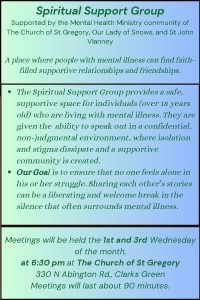VATICAN CITY (CNS) – The working document for the October assembly of the Synod of Bishops on synodality has called for responses to how all the baptized can better serve the Catholic Church and help heal humanity’s “deepest wounds.”
The document said the synod should spur the church to become a “refuge” and “shelter” for those in need or distress, and encourage Catholics to “allow themselves to be led by the Spirit of the Lord to horizons that they had not previously glimpsed” as brothers and sisters in Christ.
“This is the ongoing conversion of the way of being the Church that the synodal process invites us to undertake,” the document said.
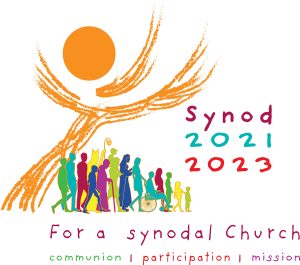
The 30-page document, called an “instrumentum laboris,” was released at the Vatican July 9. It will serve as a discussion guideline for the synod’s second session Oct. 2-27, which will reflect on the theme: “How to be a missionary synodal Church.” The reflections are the next step in the synod’s overarching theme: “For a synodal Church: communion, participation and mission.”
“In an age marked by increasing inequalities, growing disillusionment with traditional models of governance, democratic disenchantment and the dominance of the market model in human interactions, and the temptation to resolve conflicts by force rather than dialogue,” the church’s synodal style could offer inspiration and important insights for the future of humanity, the working document said.
Two key challenges facing the church are “the growing isolation of people and cultural individualism, which even the Church has often absorbed,” it said, and “an exaggerated social communitarianism that suffocates people and does not allow them to be free subjects of their own development.”
Synodal practice, however, “calls us to mutual care, interdependence and co-responsibility for the common good,” it said, and it is willing to listen to everyone, in contrast to methods “in which the concentration of power shuts out the voices of the poorest, the marginalized and minorities.”
In fact, “weakness in reciprocity, participation and communion remains an obstacle to a full renewal of the Church in a missionary synodal sense,” it added.
The document strongly encouraged the “renewal of liturgical and sacramental life, starting with liturgical celebrations that are beautiful, dignified, accessible, fully participative, well-inculturated and capable of nourishing the impulse towards mission.”
And it called for renewing “the proclamation and transmission of the faith in ways and means appropriate to the current context.”
While the second session will focus on certain aspects of synodal life, “with a view to greater effectiveness in mission,” it said “other questions that emerged during the journey are the subject of work that continues in other ways, at the level of the local Churches as well as in the ten study groups.”
In March, Cardinal Mario Grech, secretary-general of the Synod of Bishops, announced that Pope Francis had decided that some of the most controversial issues raised during the 2021-24 synod process would be examined by study groups. Among the subjects assigned to the 10 groups are the possible revision of guidelines for the training of priests and deacons, the role of women in the church and their participation in decision-making/taking processes and community leadership, a possible revision in the way bishops are chosen and a revision of norms for the relationship between bishops and the religious orders working in their dioceses.
The study groups “will complete their in-depth study by June 2025, if possible, but will offer a progress report to the synod assembly in October 2024,” the document said.
“Ahead of the conclusion of the second session, Pope Francis has already accepted some of the requests of the first session and begun the work of implementation,” it said.
A canon law commission has been set up to serve the synod, it said, and a “theological subsidy” will soon be published to help participants read and better understand the many “theological notions and categories used” in the newly released synod working document.
The work of the second session, the document said, will continue the synodal method of “prayer, exchange and discernment” as participants are invited to look at “the missionary synodal life of the Church from different perspectives” by reflecting on three aspects which emerged from previous discussions: relationships within the church, pathways for formation and places of connection.
“On this basis, a final document relating to the whole process will be drafted and will offer the pope proposals on steps that could be taken,” it said.
“We can expect a further deepening of the shared understanding of synodality, a better focus on the practices of a synodal Church, and the proposal of some changes in canon law — there may be yet more significant and profound developments as the basic proposal is further assimilated and lived,” it said.
The document, based on the results of the first session presented in the synthesis report and on further consultation with local churches, parish priests and others, listed a number of shared proposals and concerns that should be addressed at the second session:
— Formation in listening to the Word of God and others, while emphasizing the need to listen to those experiencing poverty and marginalization.
— Addressing exclusion and lack of welcome in the church, which leaves people “feeling rejected, hinders their journey of faith and encounter with the Lord, and deprives the Church of their contribution to mission.”
— Creating a “recognized and properly instituted ministry of listening and accompaniment” which enables people to approach the church without feeling judged.
— Promoting possibilities for women to further participate in church life which “often remain untapped.” This includes providing women, including consecrated women, access to positions of responsibility, such as judges in canonical processes and teaching and formation roles in theology departments, institutes and seminaries.
— Reimagining ordained ministry to help clergy avoid unnecessary burdens and isolation, and encouraging the delegation of tasks that do not require ordination to the laity. The question of admitting women to diaconal ministry will not be discussed at the second session, though a synod study group is looking at the issue.
— Enhancing transparency and accountability beyond sexual and financial abuse to include pastoral plans, working conditions and evaluation procedures for those holding positions in the church.
— Ensuring that the composition of different types of councils — parish, deanery, diocesan or eparchial — reflect the communities they serve and are able to effectively implement synodal proposals.
— Correcting the formula in the Code of Canon Law which speaks of councils as having “a consultative vote only.” This “diminishes the value of consultation and should be corrected.” “The aim of synodal ecclesial discernment is not to make the bishops obey the voice of the people, … but rather to lead to a shared decision in obedience to the Holy Spirit.”
Pope Francis chose synodality as the theme for the ordinary General Assembly of the Synod to help the church strengthen its evangelizing mission by emphasizing the need of all the baptized to deepen their journey of following the Lord and renew their responsibility to serve his mission.
Unlike earlier meetings of the Synod of Bishops, which focused on a specific issue or a specific region of the world, the “synod on synodality” is focused on providing “an opportunity for the entire people of God to discern together how to move forward on the path towards being a more synodal Church in the long-term,” according to the synod’s official handbook.


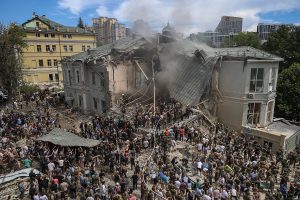

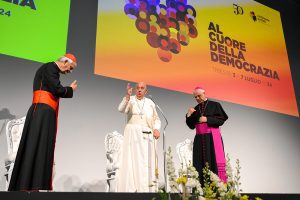
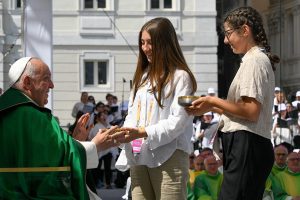
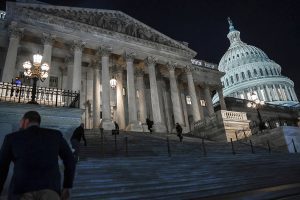
 The 2024 Vacation Bible Camp at St. Patrick’s Church in Milford, PA was a spirit and joy-filled few days as over 30 children learned about their Catholic faith, while having a great deal of fun as well.
The 2024 Vacation Bible Camp at St. Patrick’s Church in Milford, PA was a spirit and joy-filled few days as over 30 children learned about their Catholic faith, while having a great deal of fun as well.